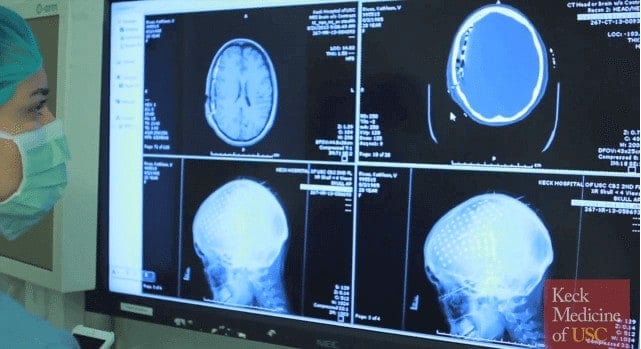Keck Medicine of USC has established the USC Neurorestoration Center, a multi-institution collaboration for breakthrough discoveries that, for the first time, bring together neural engineering, neuroscience and neurorehabilitation to restore neurological function in the human brain.
The center is the innovation of director Charles Liu and co-director Christianne Heck, who spent more than 10 years seeking the best community partners to move the treatment of neurological disorders beyond traditional surgery and medications. They aim to accomplish their goal by engineering new technology that restores neurological function while keeping the brain intact.
“As one of the nation’s leading academic medical centers, Keck Medicine of USC bridges the gap between science and medicine, and the USC Neurorestoration Center is a prime example of that pioneering approach,” said Carmen A. Puliafito, dean of the Keck School of Medicine of USC. “The center’s creation is in direct alignment with President Obama’s BRAIN Initiative, and we anticipate great things to come forth from the effort.”
BRAIN stands for the Brain Research Through Advancing Innovative Neurotechnologies Initiative, which was launched in 2013 to accelerate the development and application of new technology to treat, cure and prevent brain disorders.
The USC Neurorestoration Center brings together the world’s best minds in neurology, neurosurgery, bioengineering and neuro-rehabilitation. Founding partners include Theodore Berger of the USC Viterbi School of Engineering; Richard Andersen of the California Institute of Technology (Caltech); and Mindy Aisen of the Rancho Los Amigos National Rehabilitation Center.
The ultimate frontier
“With nearly 100 billion neurons — and 100 trillion connections — the human brain is the ultimate frontier to explore in terms of complexity,” said Liu, professor of neurological surgery and neurology at the Keck School. “Still, with all the scientific advances in understanding this vital organ, little has been done to bring those laboratory discoveries to the hospital clinic in a systematic way. The concepts we’re discussing are relevant to everybody in the world, and we are reaching out to partner institutions that include some of the very top universities in Asia and in Europe so that we can begin to collaborate together on these concepts.”
The center builds on the successes and strategic partnerships that Liu and Heck have developed over the last decade through the USC Comprehensive Epilepsy Program. By mapping, decoding and repairing basic neural circuitry of patients being treated for epilepsy at Keck Hospital of USC, the Los Angeles + USC Medical Center and Rancho Los Amigos, the team has established a solid platform from which to launch the new center.
“It’s been a long time coming,” said Heck, associate professor of neurology at the Keck School and medical director of the USC Comprehensive Epilepsy Program. “USC is an amazingly entrepreneurial place, and we want to find a way to make people’s lives better every day, whether they are suffering from epilepsy, strokes, multiple sclerosis or spinal cord injury.”
The neurosciences are a critical area of scientific and clinical study at Keck Medicine of USC, which is home to research hubs like the Institute for Neuroimaging and Informatics, with internationally renowned researchers Arthur Toga and Paul Thompson, who are leading brain mapping initiatives, and the Zilkha Neurogenetic Institute, led by Berislav Zlokovic, one of the global leaders in Alzheimer’s disease research.
The intense focus on bridging neuroscience and neurological therapies includes hundreds of worldwide collaborators working with Keck Medicine of USC to find cures for millions of people who suffer from neurological and psychiatric diseases such as Alzheimer’s, autism, multiple sclerosis, Parkinson’s and traumatic brain injury.
If our reporting has informed or inspired you, please consider making a donation. Every contribution, no matter the size, empowers us to continue delivering accurate, engaging, and trustworthy science and medical news. Independent journalism requires time, effort, and resources—your support ensures we can keep uncovering the stories that matter most to you.
Join us in making knowledge accessible and impactful. Thank you for standing with us!

